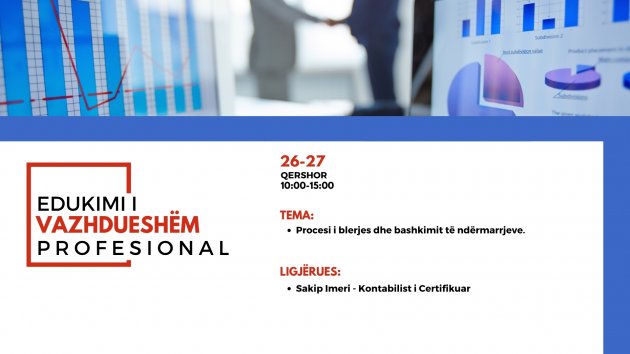Quality Management for Compliance with Standards
2017-11-16 - 12:05
Pursuant to Article 22, point (ii) as well as Article 9 paragraph 9.4 (i) of SCAAK Statute, which obliges SCAAK to implement IFAC SMOs, based on the requirements of SMO 1 -Quality Assurance and based on the requirements of the KCFR Administrative Instruction No. 03/2014 on Procedures for Supervision and Quality Control of Licensed Organizations, Audit Firms and Legal Auditors (paragraph I.1-pp. 13-14);
Relying on the fact that Statutory Auditors and Certified Accountants are independent professionals, who exercise their activity in accordance with the requirements of Law no. 06 / L-032 on Accounting, Financial Reporting and Auditing;
Relying on the role and contribution of Statutory Auditors, Certified Accountants and Certified Internal Auditors in the protection of the public interest, through the proper application of International Standards on Auditing (ISAs), International Financial Reporting Standards (IFRSs) International Accounting Standards (IASs), International Standards for the Professional Practice of Internal Auditing (IIA Standards), and compliance with the requirements arising from the IFAC Code of Ethics, the Assembly and the Council of SCAAK have approved the quality management service for compliance with standards for all members of the society.
What does Quality Management for Compliance with Standards include and how it is organized?
Quality Management for Compliance with Standards (QMCS) is organized by the Quality Management for Compliance with Standards Department (QMCSD) of the SCAAK Executive Office. It is a procedure that aims to verify and ensure that Members are properly implementing the legal requirements and requirements of the International Standards and Code of Ethics.
Quality Management for Compliance with Standards (QMCS) includes:
- Quality management of an audit engagement;
- Quality management implemented within the statutory audit firm / statutory auditor;
- Quality management of individual internal audit engagement;
- Quality management of preparation of individual financial statements and explanatory notes.
Quality management of an audit engagement is guaranteed by the proper implementation of International Standards on Auditing (ISAs) and the IFAC Code of Ethics requirements that are applicable in the context of individual engagements.
Quality management implemented within the statutory audit firm/ statutory auditor is guaranteed by the establishment of internal review for the purposes of compliance with ISQC 1 requirements.
Quality management of individual internal audit engagement is guaranteed by the proper implementation of requirements described in International Standards for Professional Practice of Internal Audit and Code of Ethics.
For services provided by Certified Accountants and Certified Auditors, members of SCAAK, this system includes the review of accounting engagements regarding the preparation and signing of financial statements as required by law, and whether all requirements of International Accounting Standards (IAS), International Financial Reporting Standards (IFRSs) and the International Financial Reporting Standard for SMEs (IFRS for SMEs) are met.
Who is subject to quality management for compliance with standards?
SCAAK members who hold the following professional designation are subject to Quality Management for Compliance with Standards:
- Statutory Auditor (SA)
- Certified Auditor (CA)
- Certified Accountant (CAcc)
- Certified Internal Auditor (CIA)
What do Members benefit from quality management for compliance with standards?
Quality management for compliance with standards helps members to ensure compliance with the requirements of Professional Standards and the Code of Ethics. It assists in maintaining the reputation of members and the profession, and at the same time increases users' confidence in audit reports, financial statements and the information contained therein.
Upon completion of a review for quality management for compliance with standards Members will receive a Detailed Report with findings and recommendations for improvement, as well as a proposal for additional hours of CPSs in necessary cases, which indirectly affect the quality of services provided.
High quality reporting provides useful information to decision makers, which is important and faithfully represents the economic reality of the company's activities during the reporting period, as well as the financial condition of the company at the end of the period.
Publications
In this section you can find the publications of the Quality Management for Compliance with Standards
Legal Requirements for Financial Reporting for Micro-Entities, SMEs, Large Entities & PIEs



